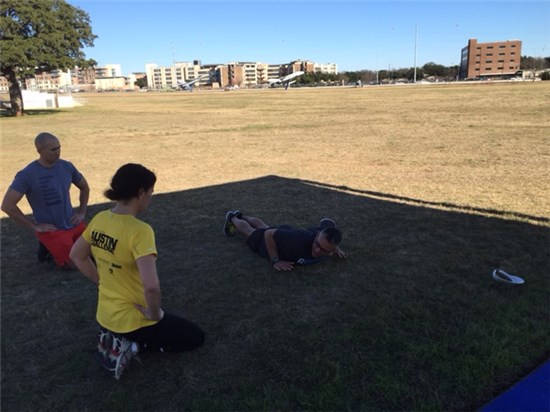 Week 4
Week 4
We planned to meet at the track after work to check our progress. How many pushups can we do? Sit-ups? And how is our time on the two-mile run?
Tracy went first and counted twelve pushups. Courtney did eleven. We then each did fourteen sit-ups. Or so we thought!
SGT Cook and SGT De la Garza, Master Fitness Trainers, saw us and came to our rescue to give us guidance on proper form for pushups and sit-ups. They demonstrated and helped us with our pushup form, hand positioning, and getting our upper arms parallel to the ground.
After we tried our pushups and sit-ups using what they taught us, we realized we can only do one or two proper pushups (i.e. pushups that would PASS the PT test). We did have some success this week however, as we completed our two-mile run in 22:34, which is above the 60% standard for both of us!
The Master Fitness Trainers also demonstrated several exercises we should do prior to each workout, as well as exercises to help build upper body and core strength. Their knowledge is vast, their patience immense, and we so appreciate their willingness to help and teach us.
Physical fitness tips (from the Master Trainers):
- Although doing pushups with arms placed out wide may be easier and will ‘pass’, moving hands closer together (directly under your shoulders) will help to protect your shoulders and joints from strain.
- Squeezing glute muscles will help you maintain a straighter plank or pushup position.
- To build upper body strength, lie flat on the ground and lift your body into the push-up position, then return to lying on the ground, and push back up.
Mental fitness tips:
If you keep active, you are:
- less likely to be depressed, anxious or tense
- more likely to feel good about yourself
- more likely to concentrate and focus better
- more likely to sleep better
- more likely to cope with cravings and withdrawal symptoms if you try to give up a habit such as smoking or alcohol
- more likely to be able to keep mobile and independent as you get older
- possibly less likely to have problems with memory and dementia
from: Royal College of Psychiatrists (http://www.rcpsych.ac.uk/healthadvice/treatmentswellbeing/physicalactivity.aspx)
Commentary by Courtney J. Lynch and Tracy K. Ward, Psychological Health Coordinators